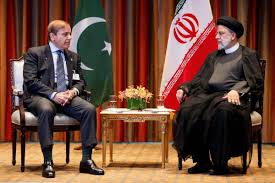
A Strategic Partnership for Energy Security
In a significant move to address the growing energy demands of both nations, Pakistan and Iran have launched a collaborative energy project aimed at enhancing energy security and boosting economic cooperation. With both countries facing rising electricity consumption, the partnership seeks to develop infrastructure that will help meet these demands and reduce dependency on external sources of energy. By leveraging their shared geographic proximity and resources, Pakistan and Iran aim to create a more sustainable energy future for the region, with a focus on cross-border energy trade and infrastructure development.
Joint Development of Energy Infrastructure
The core of the new energy initiative involves the construction of energy infrastructure, including power plants and transmission lines, that will allow both countries to share energy resources more efficiently. Iran, with its surplus natural gas production, will provide Pakistan with the necessary fuel for power generation, while Pakistan will invest in the transmission and distribution infrastructure to bring this energy to key regions. This will not only ensure a reliable supply of electricity for Pakistan’s growing industrial and residential needs but also enhance Iran’s energy export capacity. The project represents a long-term investment in the regional energy market, fostering closer economic ties between the two neighboring countries.
Renewable Energy Focus for Sustainable Development
While the collaboration will initially focus on conventional energy sources, both countries have expressed their commitment to incorporating renewable energy solutions into the project. As part of the broader agreement, Pakistan and Iran plan to explore opportunities for solar and wind energy production in their respective territories. Pakistan, in particular, has vast untapped potential for renewable energy in its southwestern and northern regions, while Iran has made significant strides in solar power. By investing in clean energy technologies alongside traditional energy projects, the two nations aim to reduce their carbon footprints and contribute to global sustainability goals. This focus on renewable energy is expected to become a central component of future energy initiatives between Pakistan and Iran.
Boosting Bilateral Economic Cooperation
The energy project is expected to significantly strengthen bilateral economic ties, with both nations reaping the benefits of a more stable and diversified energy supply. Increased energy cooperation will stimulate economic growth in both countries by facilitating industrial development, creating jobs, and enhancing the competitiveness of local businesses. Energy shortages, which have plagued both Pakistan and Iran in recent years, have hindered industrial production and economic development, but the new collaborative efforts are expected to alleviate these challenges. Moreover, the energy infrastructure developed as part of the project will create new opportunities for trade and investment, positioning both countries as key players in the regional energy market.
Long-Term Impact on Regional Stability and Cooperation
The successful implementation of this collaborative energy project holds broader implications for regional stability and cooperation. By working together on energy security, Pakistan and Iran are setting an example for neighboring countries in the Middle East and South Asia. This project not only fosters peaceful diplomatic relations but also promotes regional integration through shared resources and mutual dependence. As both nations work to meet their growing energy demands, the collaboration could open the door for future partnerships in other sectors, including water management, transportation, and technology. The success of this energy initiative could serve as a model for other regional partnerships, contributing to a more interconnected and prosperous future for South Asia and the Middle East.
Find out how to turn your PUBG skills into earnings with our tutorial

